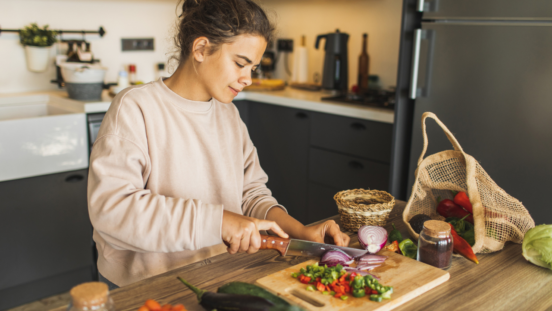The list of reasons why this woman is grateful for her miscarriage is beautiful
Two weeks after finding out she was pregnant, Shelly Mettling received the heartbreaking news.
In Australia, one in five pregnancies end in miscarriage before 20 weeks. While once a taboo conversation, more and more women are opening up and sharing their losses in an attempt to challenge the stigma surrounding losing a child before birth.
One woman has courageously shared the story of her miscarriage and shared how she was able to feel grateful despite being heartbroken.
Two weeks after discovering she was pregnant, Shelly Mettling, 28, miscarried.
Unbelievably heartbroken, Shelly took to Instagram to talk about her experience. Sharing a snap of her partner Matt and herself, red-eyed and exhausted in bed, she summed up her last 72 hours with an “UGH.”
“The only word that truly describes the emotions,” she wrote.
Shelly goes on to explain that two weeks ago she received the news that their family of two, was growing to three.
“We were excited, nervous, and extremely grateful!” she recounted.
Sadly those emotions disappeared, and while they lay in bed after losing their baby, Shelly describes her feelings as “angry, emotional, sad, confused, and frustrated.”
Yet with incredible strength, she explains that she was still holding on to one of the feelings she felt two weeks prior, when she was pregnant. Grateful.
“I’m grateful that I got to feel (even for a short time) the power of motherhood!” she wrote.
“I’m grateful that I got to experience the bond that a woman feels the instant she finds out she is growing a little human in her belly.”
“I’m grateful I got to feel the love I was capable of feeling/giving to someone that I had never even met.”
The amazing young woman also said that she was grateful for her family and friend who were checking on her and lifting her up after she’d been “so knocked down, it’s hard to visualise standing again!”
“I’m sad, I’m heartbroken, I’m torn to pieces. But I’m grateful!” she concluded.
READ THIS NEXT: We never thought miscarriage would happen to us
Shelly’s brave story touched many women, who then jumped on her Instagram account to show their support and share their stories.
“I’m so sorry Shelly!” said one woman. “We’ve been trying for two years, if you ever need to chat.”
Another wrote: “Very sorry to hear…Having been a parent who has lost a child, I understand and feel your pain.”
“My first baby would have been 17 years of age November 10th,” wrote one Instagram user. “You never ever forget, but I am truly blessed with my family I have now.”
Why we need to talk about miscarriage
Recent studies have suggested that women suffer silently with post-traumatic stress disorder (PTSD) after losing a baby.
A study on nearly 90 women who attended the pregnancy clinic at Imperial College London for a suspected miscarriage or ectopic pregnancy, showed that almost four in 10 women met the criteria for probable PTSD three months after suffering the loss of a pregnancy.
Findings like these highlight the importance for us to have a more open dialogue around miscarriage.
Thankfully there are honest and selfless women like Mettling who are opening up the conversation.

Before giving birth to her daughter Tallulah Franklin in February, 2020, Jesinta Franklin has spoken out about her fertility struggle and losses.
Stories of miscarriage
The dialogue surrounding miscarriage is becoming more open and honest as celebrities have publicly shared their own experiences of miscarriages in an effort to let women know they are not alone. Celebrities who have miscarried and spoken openly about it include, Megan Gale, Jennifer Hawkins, Laura Byrne and Beyonce who had a miscarriage before giving birth to her daughter Blue Ivy.
We love that this mother shared her story and that she was able to find optimism and hope in a dark time. We just wish that the responsibility to speak out didn’t just fall on women. Losing a baby isn’t just a women’s issue, it affects us all.
If you, or someone you know has suffered from a miscarriage, loss of a child, or PTSD and would like to talk to someone, visit Pink Elephant Support, or PANDA (Perinatal Anxiety & Depression Australia).




